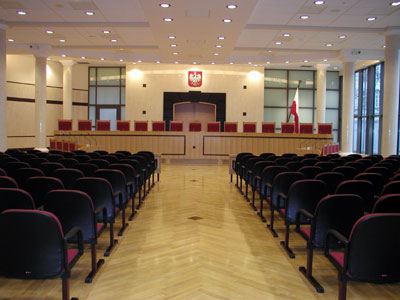2020-03-05
FOR Communication 5/2020: Proceedings before the Constitutional Court on the "Dispute of Competence": a Path to Further Destruction of the Rule of Law
 Summary:
Summary:
- On 15 January 2020, the First President of the Supreme Court, Professor Małgorzata Gersdorf, submitted a motion to remove the discrepancies in the interpretation of the provisions, occurring in the jurisprudence of the Supreme Court, in connection with the legal status of judges appointed by virtue of the pseudo-NCJ (National Council of the Judiciary) appointments. This motion was to be considered in the composition of the three joint Chambers of the Supreme Court: Civil, Criminal and Labor and Social Security Chambers.
- On 22 January 2020, even before the adoption of the Resolution, the Speaker of the Sejm of the Republic of Poland, Elżbieta Witek, submitted a motion to the Constitutional Tribunal to resolve the "dispute of competence" between the Supreme Court and the Sejm and the Supreme Court and the between the Supreme Court and the President of the Republic of Poland.
- The motion of the Speaker of the Sejm de facto questions the right of the Supreme Court to interpret the provisions of law and aims to freeze the effectiveness of a possible Resolution.
- On 23 January 2020, acting within the framework of their statutory powers, the three joint Chambers of the Supreme Court adopted a Resolution in which they indicate the possibility of challenging the validity of proceedings or revoking judgements that would have been handed down as a result of decisions involving judges nominated by the pseudo-NCJ.
- By the decision of 28 January 2020 the Constitutional Tribunal "suspended" the Resolution of the three Chambers until the motion of the Speaker of the Sejm is considered.
- Both the Supreme Court and the Ombudsman, who joined the proceedings before the CT, indicate that there is no dispute of competence in this case.
- On 3 March 2020, a hearing before the Constitutional Tribunal was held, boycotted by two participants: The Ombudsman and a representative of the Supreme Court, the First President of the Supreme Court, who presented their positions in writing. Three persons regarded as "doubles" were present in the composition of the Tribunal's judges.
- The Court postponed the hearing until 12 March 2020 in order to allow the Court to continue asking questions to the participants present by the composition of the Court.
Author:
Eliza Rutynowska, lawyer
Files to download

